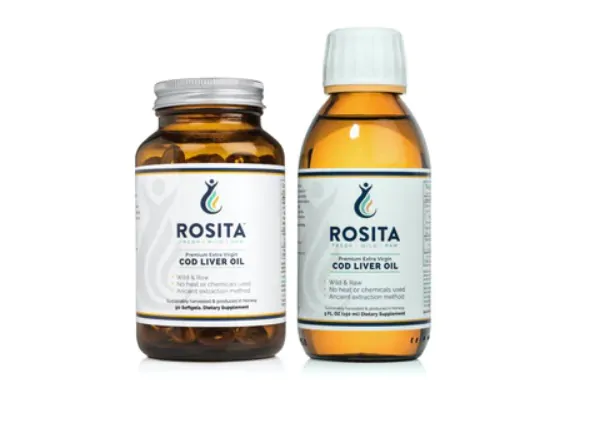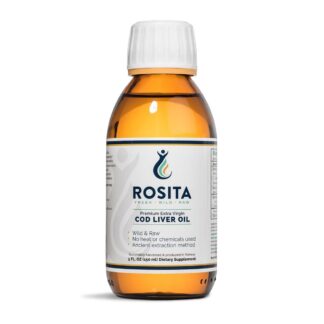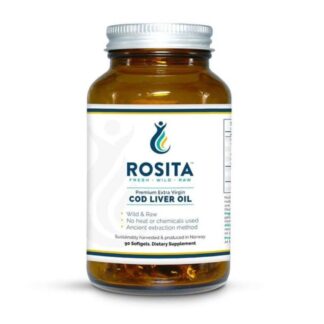Rosita Extra Virgin Cod Liver Oil (EVCLO) Softgels
90 Capsules
Maximum order quantity: 6
89 in stock
-
Nutrient dense:Contains 100% naturally occurring nutrients: vitamins A and D, and a full spectrum of omega fatty acids (including EPA and DHA); no synthetic vitamins.
Sustainable:Authentic cod are caught hook and line on our own fishing boats in Norway.
Unprocessed & raw:Oil is quickly and naturally released — without heat, chemicals or mechanics.
Convenient:Does not require refrigeration; ideal for those who’d rather skip the taste of fresh fish and fantastic for travel.
A fresh, nutrient-rich cod liver oil for on the go! Rosita Extra Virgin Cod Liver Oil softgels have the same exceptional oil as our wildly popular liquid version.
Benefits of Rosita Extra Virgin Cod Liver Oil softgels (capsules)
Here are a handful of reasons why many prefer our cod liver oil capsules:
What’s inside your natural cod liver oil softgels (capsules)
These little capsules contain only fresh, wild-caught and raw cod liver oil.
Straight from the clean Norwegian seas, the oil has 100% naturally occurring nutrients, like vitamins A and D, and a full spectrum of omega fatty acids, including Omega 3 EPA and DHA.
A serving size of 3 Rosita Extra Virgin Cod Liver Oil softgels has:
Here are more special features that set Rosita cod liver oil softgels apart:
Learn about more benefits of Rosita Cod Liver Oil, here.
Wild & Raw Extra Virgin Cod Liver Oil (fish) (99.91%), Rosemary extract (0.04%) and non-GMO Vitamin-E (0.05%). Softgel (fish gelatin, water, glycerin).
Allergens: Fish
Best taken with food, as needed.
To maintain the Rosita softgels in the best possible state for the longest time, keep them in dark storage at room temperature, ideally ranging from 58°F to 78°F (15°C to 25°C).
Short temperature exposure either way has little-to-no impact on the oil. Cold temperatures over prolonged periods can increase the permeability of the gel and so they should not be refrigerated or frozen.
The shelf life of Rosita Extra Virgin Cod Liver Oil softgels is three years from the production date.
Key Nutritional Facts*
417
MG
Omega-3s per serving
90
Softgels
Per Bottle
120
IU
Vitamin D per serving

Testing
HOW WE TEST OUR EXTRA VIRGIN COD LIVER OIL
Rosita Extra Virgin fish oils are tested by the following leading European Institutes (listed below) to make sure our products are pure, fresh and clean. Each batch of undergoes rigorous testing for heavy metals, organic contaminants, oxidation, bacteria, microplastics, and radioactivity. Test results are available upon request.
EUROFINS - Eurofins is an international group of laboratories headquartered in Luxembourg, providing testing and support services to the pharmaceutical, food, environmental, agriscience and consumer products industries and to governments.
ALS Food & Pharmaceutical (UK) - ALS provide a comprehensive range of microbiological, physical and chemical testing services combined with industry leading technical expertise and customer service.
Biodetection Systems B.V. (BDS) - To protect our health and the environment by offering and applying innovative, sensitive, and efficient in vitro test methods – that is what BioDetection Systems stands for.
All productions are tested for contaminants before being bottled and released for sale.
Please find the test results for the latest productions of Rosita Premium EVCLO Softgels in the table below:
| WHO PCDD/F-TEQ |
WHO-PCDD/F PCB-TEQ |
PCB 28-52-101-138-153-180 |
|
| EU REGULATION | 1.75 pg/g | 6.00 pg/g | 200 ng/g |
| NORWEGIAN REGULATION | 1.75 pg/g | 4.00 pg/g | 200 ng/g |
|
Test results Rosita Extra-Virgin Cod Liver Oil (EVCLO) - Softgels: |
|||
| Production date: February 2020 (Testing by EUROFINS Report #440-2020-0218-010) - BBE: FEB 2023 BN: 061782 |
0.343 pg/g | 0,874 pg/g | 157 ng/g |
| Production date: October 2019 (Testing by EUROFINS Report #440-2019-1008-064) - BBE: DEC 2022 BN: 058347 |
0.327 pg/g | 0.59 pg/g | 48.1 ng/g |
| Production date: June 2019 (Testing by EUROFINS Report #440-2019-0308-076) - BBE: JULY 2022 |
0.337 pg/g | 0.92 pg/g | 106 ng/g |
| Production date: August 2018 (Testing by EUROFINS Report #440-2018-0417-050 and BDS - Report #13453-1) - BBE: AUG 2021 |
0.30 pg/g | 0.60 pg/g | 115.0 ng/g |
| Production date: February 2018 (Testing by EUROFINS Report #440-2018-0125-074) - BBE: FEB 2021 |
0.342 pg/g | 0.98 pg/g | 90.8 ng/g |
|
Production date: October 2017 |
0.300 pg/g | 1.30 pg/g | 83.7 ng/g |
|
Production date: December 2016 |
0.300 pg/g | 2.50 pg/g | 126.0 ng/g |
|
Production date: August 2016 |
0.700 pg/g | 2.00 pg/g | 97.9 ng/g |
The concentration of fat-soluble nutrients depends on several biological factors, including the size of the fish and the amount of oil contained in the liver. There are also seasonal variations related to the spawning cycle of the fish, climatic conditions, plankton, and other conditions affecting the codfish. Because Rosita EVCLO is a completely unrefined & unprocessed wholefood, the concentration of nutrients will ALWAYS vary from batch to batch.
The Nutrient Results (fat-soluble vitamins, sterols & fatty acids) shown below represent typical values and ranges which have been obtained from analytical testing at the following institutes:
- NIFES (National Institute of Nutrition and Seafood Research )[20/12/2010]
- ALS Food & Pharmaceutical (United Kingdom) [10/10/2012]
- Eurofins Food Testing [19/02/2013]
- Nutrition Analytical Service (NAS), Institute of Aquaculture, University of Stirling, Scotland, United Kingdom [15/11/2013]. The head of NAS, Professor Gordon Bell, has over 30 years of experience in fish nutrition and lipid and nutrition related analysis and has published more than 184 peer-reviewed papers on fish nutrition, fatty acids, lipid soluble nutrients and antioxidants. The Chief Analyst, James Dick, provides over 25 years of experience in lipid methodology and is responsible for Quality Control within the Nutrition Group, the development of chromatographic techniques and is trained in all aspects of complex lipid analysis including HPLC, GC, GC/MS and GC/MS/MS.
- Extra virgin oil was also tested [as far back as: 15.07.2011] by the producer at ECO-Marine using a Norwegian Aquaculture Research Institute which specialises in marine raw materials and products.
VITAMIN E (ALPHA-TOCOPHEROL) ANALYSIS
|
SAMPLE ID |
mg/teaspoon |
|
Wild & Raw EVCLO |
3.7-10 |
VITAMIN A (RETINOL) ANALYSIS
|
SAMPLE ID |
iu/teaspoon |
|
Wild & Raw EVCLO |
3000-5000 |
VITAMIN A2 (3,4-DEHYDRORETINOL) ANALYSIS
|
SAMPLE ID |
mg/kg |
|
Wild & Raw EVCLO |
> = 0.1 |
VITAMIN D3 (CHOLECALCIFEROL) ANALYSIS#
|
SAMPLE ID |
iu/teaspoon |
|
Wild & Raw EVCLO |
400-500 |
RATIO VITAMINS A:D
|
SAMPLE ID |
ratio |
|
Wild & Raw EVCLO |
Typically less than 10:1 |
STEROL CONTENT
|
SAMPLE ID |
mg/Kg |
|
Wild & Raw EVCLO |
|
|
CHOLESTEROL |
4044-5245 |
|
BRASSICASTEROL (PHYTOSTEROL) |
40.4 |
|
Rest to follow |
|
Select Fatty Acid Composition of Total Lipid from Wild & Raw EVCLO
|
Fatty acid |
mg/teaspoon |
|
20:5n-3 (EPA) |
510 |
|
22:6n-3 (DHA) |
700 |
|
18:1n-9 (Oleic acid) |
1,200 |
|
20:1n-9 (Gadoleic acid)* |
660 |
|
22:1n-11 (Cetoleic acid)* Fatty acids, Sum of Omega 6 Calc. Fatty acids, Sum of Omega 3 Calc. Unidentified fatty acids |
375 160 1,460 240 |
|
ratio |
|
|
DHA/EPA∆ |
1:1 – 1.3:1 |
|
Omega 6/Omega 3 Ratio |
0.11 |
∆This ratio is a good indicator of genuine Northern hemisphere cod liver oil.
Cod Liver Oil has been tested for purity by leading European institutes and meets all the stringent European requirements.
HEAVY METAL CONTENT
[ALS Food & Pharmaceutical (UK): 10/10/2012]
|
SAMPLE ID |
Wild & Raw EVCLO |
|
MERCURY |
n.d |
|
CADMIUM |
n.d |
|
LEAD |
n.d |
|
ARSENIC |
1.4 ppm* |
ppm - parts per million
n.d - not detected
*organic (non-toxic) form
HEAVY METAL ANALYSIS
[BioDetection Systems b.v. (BDS): 19/03/2013]
|
SAMPLE ID |
Wild & Raw EVCLO |
|
MERCURY |
n.d |
|
CADMIUM |
n.d |
|
LEAD |
n.d |
|
ARSENIC |
1.8 ppm* |
ppm - parts per million
n.d - not detected (the concentration of the analyte is below the limit of quantification).
*organic (non-toxic) form
ORGANIC CONTAMINANTS [Dioxins and PCBs, Benzo(a)pyrene]
Certificate of Analysis from:
- ALS Food & Pharmaceutical (UK) [10/10/2012]
- BioDetection Systems b.v. (BDS) [19/03/2013]
Cod liver oil has been analysed in triplicate and each time gives a total WHO-PCDD/F-PCB-TEQ lower than the strict European limits and well within them. The values for the oil are in line with QC parameters.
A. POLYAROMATIC HYDROCARBONS
|
SAMPLE ID |
BENZO(A)PYRENE
(mg/kg)
|
|
Wild & Raw EVCLO |
<0.001# |
#the concentration of the analyte is below the limit of quantification
Above value calculated from analyses performed in duplicate.
B. DIOXINS and PCBs
- Sum of dioxins (WHO-PCDD/F-TEQ): 0.20 ng/kg#
- Sum of dioxins and dioxin-like PCBS (WHO-PCDD/F-PCB-TEQ): 0.899 ng/kg#
#Maximum levels set by the European Commission for thesum of dioxins (WHO-PCDD/F-TEQ) for marine oils (fish body oil, fish liver oil and oils of other marine organisms intended for human consumption): 1.75 ng/kg fat
#Maximum levels set by the European Commission for thesum of dioxins and dioxin like PCBs (WHO-PCDD/F-PCB-TEQ) for marine oils (fish body oil, fish liver oil and oils of other marine organisms intended for human consumption): 6.0 ng/kg fat
#Dioxins (sum of polychlorinated dibenzo-para-dioxins (PCDDs) and polychlorinated dibenzofurans (PCDFs), expressed as World Health Organisation (WHO) toxic equivalent using the WHO-toxic equivalency factors (WHO-TEFs)) and sum of dioxins and dioxin-like PCBs (sum of PCDDs, PCDFs and polychlorinated biphenyls (PCBs), expressed as WHO toxic equivalent using the WHO-TEFs). WHO-TEFs for human risk assessment based on the conclusions of the World Health Organization (WHO) – International Programme on Chemical Safety (IPCS) expert meeting which was held in Geneva in June 2005 (Martin van den Berg et al., The 2005 World Health Organization Re-evaluation of Human and Mammalian Toxic Equivalency Factors for Dioxins and Dioxin-like Compounds. Toxicological Sciences 93(2), 223–241 (2006))
C. BDS DR CALUX technique: another screening method for dioxins and dioxin-like PCBs
|
SAMPLE ID |
Method |
Parameter |
Result |
Unit |
|
Wild & Raw EVCLO |
DR CALUX |
PCDD/PCDF and dl-PCBs (total BEQ; semi) |
compliant (1.7) |
ng BEQ/kg product |
The DR CALUX analysis is done according to p-bds-051.
All DR CALUX analysis results comply with EU requirements as indicated in COMMISSION REGULATION (EC) No 278/2012 (amending Regulation (EC) No 152/2009 as regards the determination of the levels of dioxins and polychlorinated biphenyls; feedstuffs).
TOTOX ANALYSIS
Extra virgin oil was also tested by the producer at ECO-Marine using a Norwegian Aquaculture Research Institute which specialises in marine raw materials and products. Extra virgin oil was also tested as far back as 15.07.2011
|
SAMPLE ID |
PEROXIDE VALUE * |
ANISIDINE VALUE * |
TOTOX * |
|
Wild & Raw EVCLO |
4.8 |
2.2 |
11.8 |
PV expressed as Meq/Kg
AV expressed as anisidine value units
TOTOX = 2PV+AV
TOTOX ANALYSIS
|
SAMPLE ID |
PEROXIDE VALUE * |
ANISIDINE VALUE * |
TOTOX * |
|
Wild & Raw EVCLO |
0.38 |
0 |
0.76 |
PV expressed as Meq/Kg
AV expressed as anisidine value units
TOTOX = 2PV+AV
TOTOX ANALYSIS
Extra virgin oil was also tested by the producer at ECO-Marine using a Norwegian Aquaculture Research Institute which specialises in marine raw materials and products. Extra virgin oil was also tested as far back as 15.07.2011
|
SAMPLE ID |
PEROXIDE VALUE * |
ANISIDINE VALUE * |
TOTOX * |
|
Wild & Raw EVCLO |
2.9 |
6.6 |
12.4 |
PV expressed as Meq/Kg
AV expressed as anisidine value units
TOTOX = 2PV+AV
TBAR ANALYSIS
|
SAMPLE ID |
TBARS (mg/kg) |
|
Wild & Raw EVCLO |
0.25 |
Above value calculated from analyses performed in duplicate.
TBARs are expressed as mg/kg for feeds and oil and nmole/g tissue for flesh or other tissues.
[Extra virgin oil was also tested by the producer at ECO-Marine using a Norwegian Aquaculture Research Institute which specialises in marine raw materials and products. Extra virgin oil was also tested as far back as 15.07.2011]
|
SAMPLE ID |
A as Oleic |
|
Wild & Raw EVCLO |
0.6 |
|
SAMPLE ID |
mg KOH/g |
|
Wild & Raw EVCLO |
1.2 |
MICROBIOLOGICAL CONTENT
[ALS Food & Pharmaceutical (UK): 10/10/2012]
|
SAMPLE ID |
cfu/ml |
|
Wild & Raw EVCLO |
|
|
Total Viable Count |
<1 |
|
Coliforms (presumptive) |
0 |
|
Escherichia coli (presumptive) |
<1 |
|
Yeasts |
<2 |
|
Moulds |
<2 |
|
Salmonella sp. (ELISA) |
Not detected / 25g |
|
Calories 45 |
Calories from Fat 45 |
|
|
% Daily Value* |
|
Total Fat 4.5g |
7.0% |
|
Saturated Fat 0.9g |
4.5% |
|
Trans Fat 0g |
0% |
|
Cholesterol 18mg |
6% |
[Performed by a third party, independent Norwegian laboratory].
- Shelf-life of unopened bottles at a temperature of 0-4 °C is 12 months.
- For storage at -20 °C the shelf-life is 2-3 times longer.
- Shelf-life after the bottles are opened at 0-4 °C is 2-3 months.
- Testing has shown that vitamins and other substances found in Rosita EVCLO are not affected by freezing and remain completely intact.
- In summary, the oil must be kept dark and cold.
Customer Reviews 0
0
Based on 0 reviews
(0)
(0)
(0)
(0)
(0)
ENDORSED BY











